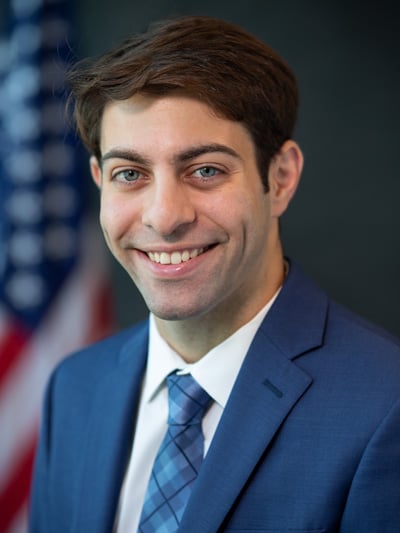-
 Legislative Director and Special Assistant to the Executive DirectorNational Association of Attorneys General
Legislative Director and Special Assistant to the Executive DirectorNational Association of Attorneys General
State attorneys general have often sought other political offices after their service as chief legal officer of their state. Lately, incumbent and former members of Congress have decided to run for state attorney general instead.
There’s a long-standing joke that “AG” doesn’t just stand for attorney general but for “aspiring governor” as well. At present there are seven former attorneys general serving as governor, six as U.S. senator and three incumbent or former attorneys general are currently running for seats in the U.S. Senate. But now, the office of attorney general is starting to attract its fair share of aspirants from Congress.
An attorney general’s ability to make direct impact for their constituents and affect national policy through litigation instead of legislation has begun to encourage some sitting members of Congress to return home. The incumbent attorneys general in Louisiana, Indiana, and Minnesota all previously served in Congress. As of today, two sitting members of the House of Representatives have announced they intend to leave Congress this year to run for attorney general in Maryland and Texas and former representatives are running for attorney general in Arkansas and Idaho.
Why leave Congress?
Being a member of Congress comes with plenty of enviable perks. The salary is higher than all but five attorneys general for even the most junior members, members enjoy franking privileges on any official mail, and there are opportunities to pass legislation that will impact the entire nation. On top of the official job benefits, members of Congress have enviable job security. In 2016, 96.7% of all incumbents won their reelection campaign. So why would a member leave to run for state attorney general?
When asked that question, Representative Anthony Brown of Maryland, who recently announced his candidacy for Maryland attorney general, replied, “this is not about leaving or running away from Congress, it is about moving in the direction of a position that gives me the opportunity to do even more for the people of Maryland.” This sentiment was similarly expressed when Minnesota Attorney General Keith Ellison and former California Attorney General Xavier Becerra announced they were leaving Congress, where they had served a combined 36 years, to run for the office of attorney general in their states.
Attorneys general can have direct impact that congressional gridlock often prevents its members from achieving. In the 116th Congress, only 7% of the 16,601 bills introduced in either chamber became law. As freshmen members quickly learn upon arrival in Washington, the probability of one of their bills passing is dismally low. Freshmen members may also have to wait quite a while before rising to a leadership position with real power to move their priorities forward.
As the leaders of independent agencies, which are often also the largest law office in their state, attorneys general are not constrained by many of the hurdles that make effective legislating difficult. The decision to litigate or prosecute does not require consultation with 534 other individuals and an attorney general has full authority to act from the first day on the job.
A Tale of Two Offices
Every member of Congress released a statement during the summer of 2020 expressing their view on the murder of George Floyd by a Minneapolis police officer. Legislation was quickly introduced in both chambers to try to address issues that led to his murder. Had Minnesota Attorney General Keith Ellison still been a member of the House of Representatives, undoubtedly he too would have released statements and worked on legislative solutions. More than eighteen months later, Congress has not passed any significant police reform bills. In less than twelve months after the murder, Keith Ellison, in his role as Minnesota attorney general, successfully led the prosecution team that secured a conviction and 270 month sentence for the responsible officer.
Even with well-intentioned statements and attempts at legislation, no member of Congress could have had the impact Attorney General Ellison did. Their office and role didn’t give them that opportunity. A week after launching his first campaign for attorney general, then-Congressman Ellison outlined the strength of the role of attorney general as one of his motivations for leaving Congress when he said, “there’s some things a member of Congress can’t do. You cannot take immediate action to protect rights of people.” Though he could never have predicted the specific events of 2020, his statement at the time would prove to be remarkably accurate in foreshadowing his own time as attorney general.
On the other hand, when Congress can act, the impact can be profoundly felt. The Violent Crime Control and Law Enforcement Act of 1994 changed criminal justice in a way that no single case could. Since the murder of George Floyd, state legislatures have also changed the landscape for policing by introducing police accountability legislation in 36 states and the District of Columbia. Every level of government is essential. The nimbleness of an attorney general office gives the officeholder the ability to respond in ways other institutions could not.
Lessons for Capitol Hill
In recent years, the National Association of Attorneys General (NAAG) has helped attorneys general increase their influence as advocates for bipartisan legislation on Capitol Hill. In 2020, every attorney general in the country signed a letter to Congress supporting reforms to stabilize the Crime Victims Fund. The legislation was signed into law less than a year later after a unanimous vote of approval in the Senate and the support of over 90% of the House of Representatives. This was a remarkable accomplishment for today’s legislature and emblematic of the possibilities that exist through bipartisan efforts.
Currently, NAAG is leading the national movement advocating for passage of the Mainstreaming Addiction Treatment Act, which would eliminate burdensome federal red tape for providing treatment for opioid use disorder. The legislation currently has the most cosponsors of any bill included in the Bipartisan Addiction and Mental Health Taskforce’s legislative agenda for the 117th Congress. Though the legislation is still awaiting a markup and floor vote, this is yet another prime example of attorneys general pushing Congress towards bipartisan solutions.
The opportunity attorneys general have to make real change without being caught in the slow-moving gears of Washington should lead more members of Congress to realize the best job in government is back home as the people’s lawyer. And as Congress continues to be criticized for inaction and gridlock, attorneys general will continue to focus on bipartisan solutions to our nation’s problems.




